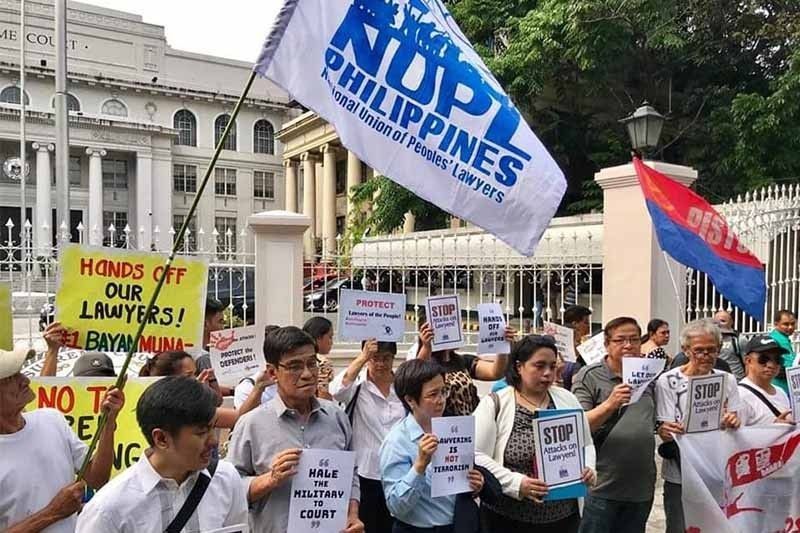Calida dismisses NUPL's plea for protection as cry for attention

MANILA, Philippines — The Office of the Solicitor General said that the pro bono lawyers’ plea for protection from the Supreme Court due to perceived state red-tagging and threats was a “cry for undue attention.”
In filing the Return of the Writ, in reply to the SC-issued writ of amparo and habeas data on May 3, the government asserted that the high court should deny the National Union of Peoples’ Lawyers plea for the writs due to lack of merit.
“[T]his case is not calibrated to exact justice but merely the posturing of rabid causelessness. It should not be dignified,” Solicitor General Jose Calida said.
Last week, the SC issued writ of amparo and habeas data to the NUPL who ran to the SC for relief from perceived threats to their life, liberty and security of President Rodrigo Duterte and his military men.
The court also ordered the Court of Appeals to hear the petition on May 14.
In its petition filed on April 15, the NUPL said that despite the increasing attacks against lawyers, particularly 36 have been killed since the Duterte administration, no case has been filed in court.
They also said that Brig. Gen. Antonio Parlade Jr. accused the NUPL and its clients as having links with communists groups. “The foregoing circumstances, in their totality, serve to engender the well-founded belief that the respondents and their agents are responsible for the attacks on NUPL and its member-lawyers that include killing, threats, harassment, surveillance and red-tagging,” they also said.
Named as respondents are President Rodrigo Duterte and his top security and military officials, including National Security Adviser Hermogenes Esperon Jr. and Defense Secretary Delfin Lorenzana.
But the respondents said that the plea was “not a distressed cry for help, but a frantic and desperate cry for undue attention.”
RELATED: NUPL elevates dangers of supposed ouster 'matrix' to SC
‘Writ of amparo a remedy of extraordinary character’
Calida also stressed that SC jurisprudence state that the writ of amparo is “an extraordinary remedy, and being a remedy of extraordinary character, it is not one to issue on amorphous or uncertain grounds but only upon reasonable certainty.”
The OSG hit the NUPL’s petition as lacking of supporting documents and, an “amalgamation of facts based on news clippings and unverified statements” that were not backed by evidence.
“Allegations, without more, are nothing but pure conjectures, and speculations that do not warrant the extraordinary remedy of the writ of amparo,” the OSG said.
“A whimsical and opportunistic filing of a case, which in ways more than one, diminished and insulted the sanctity that give rise to these Rules,” Calida added.
Calida stressed that mere allegations do not merit the issuance of an extraordinary remedy, “[o]therwise, it would be an utter disregard to the Supreme Court’s warning that ‘the remedy ought to be resorted to and granted judiciously, lest the ideal sought by the Amparo Rule be diluted and undermined by the indiscriminate filing of amparo for purposes less than the desire to secure amparo reliefs and protection and/or on the basis of unsubstantiated.”
More groups followed suit
Days after the SC issued the writs for NUPL, Karapatan, Rural Missionaries of the Philippines (RMP) and Gabriela sought for the same relief from the court.
“This petition invokes the jurisdiction and power of this Honorable Court to issue these protective writs in favor of Petitioners who are constantly threatened and harassed, red-tagged and maliciously terrorist-labeled only because of their advocacies in various fields of human rights work,” their petition, filed with the assistance of the NUPL, read.
The petitioners said that the “red-tagging and terrorist-labeling” of Duterte and his men “became more systematic” through Executive Order No. 70 on Dec. 4 2018 that created national task force to end local communist armed conflict.
Through the creation of task force, the threats against the life, liberty and security of the petitioners were aggravated, as the government order “is an expression of a government policy directed against legitimate civil society organizations, activities and human rights defenders,” said the groups. — Kristine Joy Patag
- Latest
- Trending

































